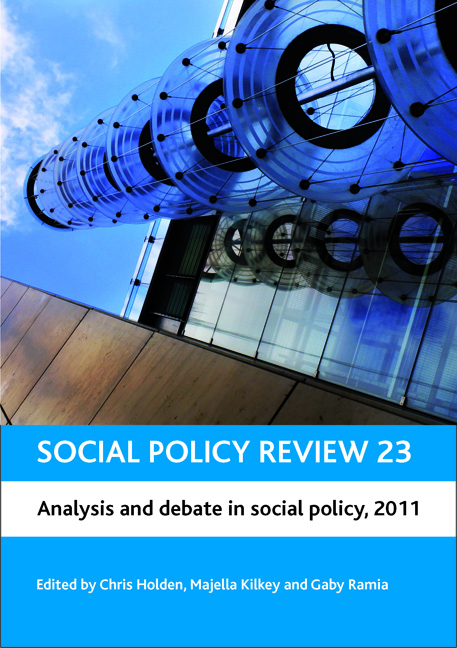Part Two - Education in international context
Published online by Cambridge University Press: 01 September 2022
Summary
Introduction
Given the importance of education to life opportunities, it is perhaps surprising that education has not been more prominent in social policy debate. In the contemporary UK context of welfare and general public sector cuts and restructuring, education stands as one of the main weapons against social and economic marginalisation and a means of re-fortifying progressive citizenship. Lest it only be seen in terms of protection against market excesses, however, education is also vital to national economies themselves, in particular to the building of their global competitiveness within the knowledge economy. As the chapters of this section of Social Policy Review 23 reveal, changes in education at all levels in recent times have reflected a profound questioning and re-definition of traditional conceptions of citizenship, and the most potent conduits for education restructuring have been internationalisation and marketisation. The influence of these two trends is all the greater because of their mutually reinforcing character.
With the themes of citizenship, markets and internationalisation in mind, Part Two begins with Chapter Eleven by Ben Kisby and James Sloam, who focus specifically on ‘citizenship education’ in the UK and comparable countries. They discuss separately the programmes of England, Wales, Scotland and Northern Ireland, and their analysis also features the US, France and Germany. They view citizenship education in terms of ‘promot[ing] political participation in diverse, pluralistic societies’. As they point out, this is an international agenda, with the Council of Europe explicitly seeking to foster ‘education for democratic citizenship and human rights’. The chapter explores the varied approaches to citizenship education in secondary schools within the countries of interest, and the authors draw lessons from cross-national comparative discussion, principally with reference to ‘four key pillars of good practice’: political literacy, experiential learning, appropriate institutional structures and supply-side factors relating to ‘the delivery of conventional politics’. They argue that understanding citizenship education programmes in different countries serves governments well in policy learning, particularly given that there is no one recipe for national success and no ‘one size fits all’.
Chapter Twelve by Neville Harris also has major implications for citizenship through education but takes a more local approach, focusing on England.
- Type
- Chapter
- Information
- Social Policy Review 23Analysis and Debate in Social Policy, 2011, pp. 207 - 210Publisher: Bristol University PressPrint publication year: 2011



